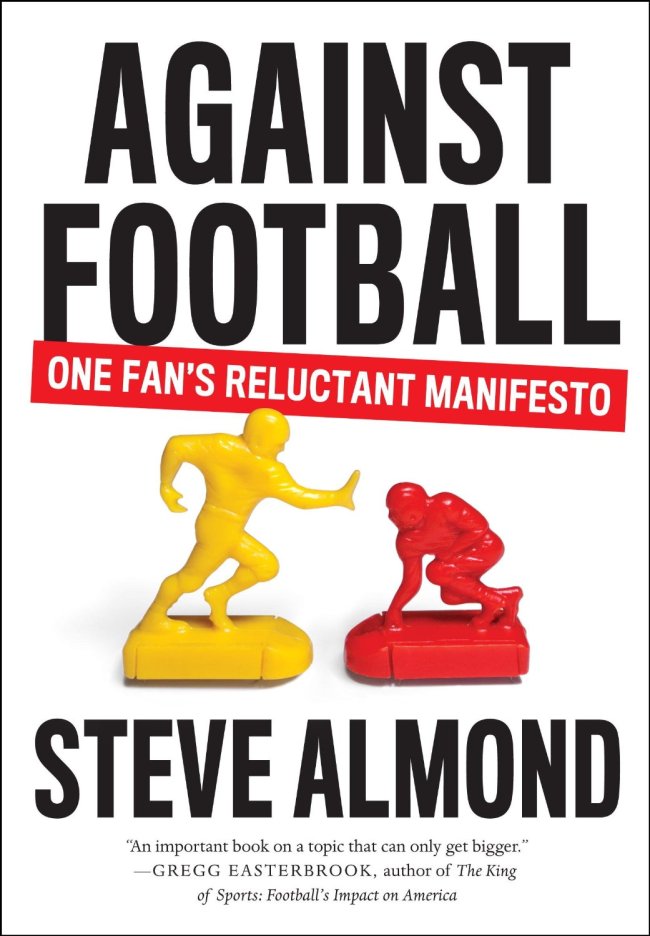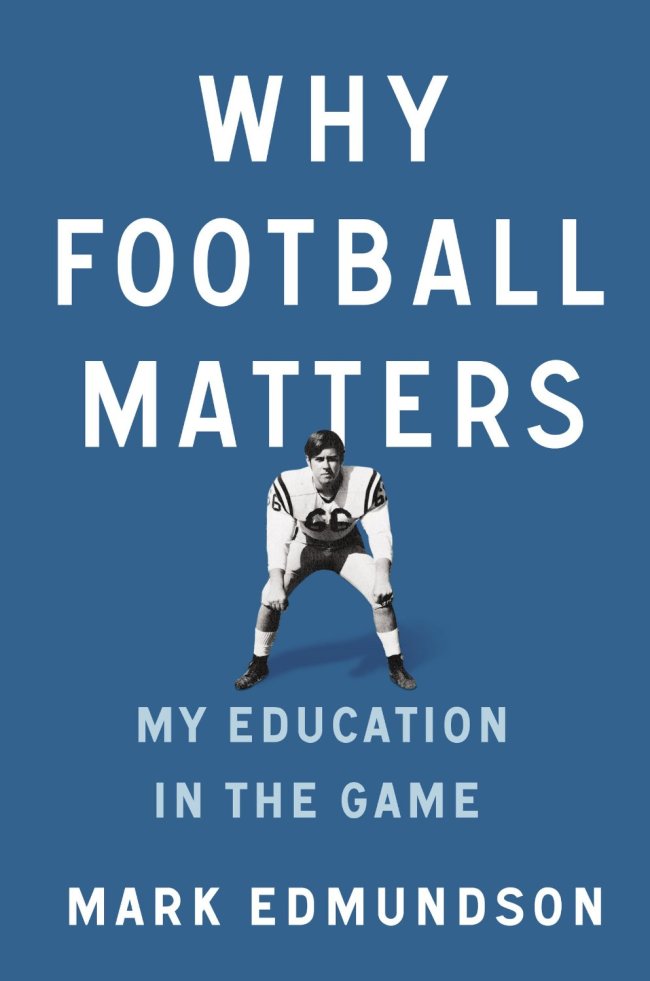Unlike Steve Almond and Mark Edmundson, the authors of two terrific new books on football, I did not grow up with a father who loved the sport.
My father thinks football is commercialized barbarism ― 22 oversized idiots plowing into one another, following a byzantine set of rules no one truly understands. For me, football is a beloved fall ritual. It’s a season of Homeric contests playing out on my television screen.
As the titles of their books suggest, Almond and Edmundson come down on similarly opposed ends of the football debate. Almond’s book, “Against Football: One Fan’s Reluctant Manifesto,” is an extended essay on why his football fandom has evolved into loathing for the sport. Edmundson’s “Why Football Matters: My Education in the Game” is an elegiac account of his youthful rescue and redemption on the high school gridirons of suburban Boston in the 1960s.
My father thinks football is commercialized barbarism ― 22 oversized idiots plowing into one another, following a byzantine set of rules no one truly understands. For me, football is a beloved fall ritual. It’s a season of Homeric contests playing out on my television screen.
As the titles of their books suggest, Almond and Edmundson come down on similarly opposed ends of the football debate. Almond’s book, “Against Football: One Fan’s Reluctant Manifesto,” is an extended essay on why his football fandom has evolved into loathing for the sport. Edmundson’s “Why Football Matters: My Education in the Game” is an elegiac account of his youthful rescue and redemption on the high school gridirons of suburban Boston in the 1960s.


“The game has a wakeup effect,” Edmundson writes after describing the pounding he received in grueling practice sessions. “You find out that no matter who you are, you get rewarded for hard work. ... Football is God in its own way. It’s uncertain whether the God above is just, but the God of football tends to be.”
Yes, football is a peculiar kind of American religion. It long ago replaced the pastoral, unhurried game of baseball as our national sport. No other game seems to so deeply embody the more complicated aspects of our national character.
America is a military superpower, and its national sport is replete with military metaphors, as both Edmundson and Almond point out. Football is an incredibly bureaucratic game too ― it has more coaches per capita than any other sport, and the rule book is so complicated, the referees should have law degrees.
But what really makes football red, white and blue are the waterfalls of profit it generates. “The business of America is business,” Calvin Coolidge once said. And the business of football is so cash-rich, its billionaire owners can afford to toss a few millions to the young men they hire to be their gladiators.
Almond can barely conceal his disgust as he describes the money fever that grips the player-prospects at the extended, televised tryout known as the “NFL combine.”
“We all know why we’re here,” one prospect yells. “‘Get money!’ on three.”
Almond is a fiction writer and former sports reporter, and his is the much more lively of the two books; it’s an unapologetic, frontal assault on the game’s role in American culture. One of his biggest beefs with football is the corporate greed of the NFL, whose owners often seek out obscenely large public subsidies. “Why must they squeeze every penny from their position of cultural power,” Almond asks. “At what point do we admit that the NFL’s true economic function is to channel our desire for athletic heroism into an engine of nihilistic greed?”
Almond is a lifelong Oakland Raiders fan, and in much of the book he confesses to a long, almost unbreakable addiction to the game. In one laugh-out-loud funny passage, he describes defending football to an Italian girlfriend who interprets the action on the gridiron as a homoerotic ritual. The players are “hugging,” she says, while watching a televised game. “Those are blocks,” Almond replies.
Eventually, what causes Almond’s love for the sport to wane is the physical damage it inflicts on the people who play it. Drawing on the latest research into head injuries, he concludes that football fans are deriving pleasure from watching men and boys inflict permanent brain damage upon one another. “What is it in our national psychology that gets off on seeing boys engage in such a savage game?”
And yet for Edmundson, a University of Virginia professor of English and author of “Why Teach? In Defense of a Real Education,” it’s the physical challenge of the game, together with the sense of teamwork and brotherhood, that is football’s gift to American culture.
“When a boy is trying to grow up, football can be a form of education that works when no others can,” he writes.
“Why Football Matters” is a moving account of his painful youth. He grew up with a father who could be distant ― except on days when he and his son watched football together. The structure and demands of football helped Edmundson navigate through the untimely death of sister. Almond, the football detractor, mostly watches football. For Edmundson, actually playing football gave him an understanding of faith.
“We prayed before every game, gentle prayer, presided over by the head coach,” Edmundson writes. “We prayed for a fair contest; we prayed we would escape serious injury and that the other team would too.”
Edmundson says he’s grateful to football for the moral strength the game gave him. “I’ve needed it to progress in my profession, to publish my books and take care of my family,” he writes. But he confesses that his “football-based character” probably came at a cost ― among other things, he says, it stifled his sense of creativity and independence.
Almond is similarly conflicted about the game. I suppose the cultured citizens of ancient Rome probably felt the same way about the blood sport unfolding inside the Colosseum.
“Maybe the way to think of football is as a kind of refuge,” Almond writes. The football field is where America allows its “lust for violence” and “patriarchal domination” to roam free, he writes.
Almond’s football-loving friends include a lot of otherwise sensitive and peace-loving men ― even poets, he writes. “It’s the place where men get to be boys ― before the age of reason, before the age of guilt.”
My own season of escapism is about to kick off any day now. I feel really bad about it. And I can hardly wait.
By Hector Tobar
(Los Angeles Times)
(MCT Information Services)
-
Articles by Korea Herald



![[AtoZ into Korean mind] Humor in Korea: Navigating the line between what's funny and not](http://res.heraldm.com/phpwas/restmb_idxmake.php?idx=644&simg=/content/image/2024/04/22/20240422050642_0.jpg&u=)
![[Exclusive] Korean military set to ban iPhones over 'security' concerns](http://res.heraldm.com/phpwas/restmb_idxmake.php?idx=644&simg=/content/image/2024/04/23/20240423050599_0.jpg&u=20240423183955)



![[Graphic News] 77% of young Koreans still financially dependent](http://res.heraldm.com/phpwas/restmb_idxmake.php?idx=644&simg=/content/image/2024/04/22/20240422050762_0.gif&u=)
![[Herald Interview] Why Toss invited hackers to penetrate its system](http://res.heraldm.com/phpwas/restmb_idxmake.php?idx=644&simg=/content/image/2024/04/22/20240422050569_0.jpg&u=20240422150649)






![[Exclusive] Korean military to ban iPhones over security issues](http://res.heraldm.com/phpwas/restmb_idxmake.php?idx=652&simg=/content/image/2024/04/23/20240423050599_0.jpg&u=20240423183955)



![[Today’s K-pop] Ateez confirms US tour details](http://res.heraldm.com/phpwas/restmb_idxmake.php?idx=642&simg=/content/image/2024/04/23/20240423050700_0.jpg&u=)